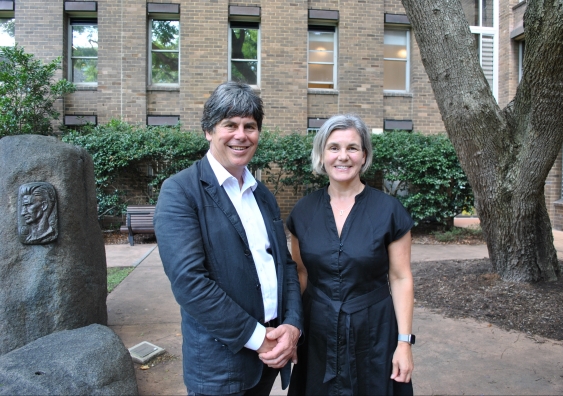Central City District Commissioner for the GCC to lead UNSW Cities Institute
Peter Poulet has commenced his appointment as director of the UNSW Cities Institute with a mission to solve the biggest challenges facing our cities.
Peter Poulet has commenced his appointment as director of the UNSW Cities Institute with a mission to solve the biggest challenges facing our cities.

Peter Poulet, the Central City District Commissioner for the Greater Cities Commission (GCC) and a former NSW government architect, has been appointed director of the UNSW Cities Institute.
Launched in August 2022, the Institute is an independent entity working with government and industry to reinvent cities for sustainable, healthy, prosperous, and socially just urban futures.
An architect with 35 years of experience in the private, public and university sector and a practising and exhibiting visual artist, Professor Poulet brings industry, government, academic and creative capability to the role. His extensive professional background includes his current role as Central City District Commissioner for the Greater Cities Commission (GCC), delivering the NSW government’s vision for Sydney’s future, and his previous appointment as NSW Government Architect, a key position he held from 2012 to 2018.
“The Cities Institute has a broad umbrella and the opportunity to engage with a variety of stakeholders and people who affect conditions in our cities, and we are able to make significant changes for the future, particularly for the next generation who are inheriting the decisions we're making now about our cities,” said Prof. Poulet.
“It highlights the notion that our cities should be more equitable and give better and more equal access to opportunities, to jobs and housing, health and wellbeing, which is essential for a successful society.”
In collaboration with government, industry, education, community, local and international partners, the UNSW Cities Institute will lead the reinvention of our cities, advancing highly productive, sustainable, prosperous, healthy, and socially just urban futures for Sydney, New South Wales, Australia and globally.
Prof. Poulet will build strategic teams to implement the values, goals, and mission of the Institute which will function as an overarching entity, enabling and elevating high impact, cross-disciplinary research, by collaborating across all UNSW faculties and key research centres. These include City Futures Research Centre, Healthy Built Environments, Centre for Social Impact, Social Policy Research Centre, and Global Water Institute. Opportunities to join the founding team are currently listed on the Institute website.
“My vision for the Cities Institute is that it will become the go-to place for independent bodies to seek advice and opinion around how our cities should work better and what we as a collective community should do to facilitate that,” he said.
“The Cities Institute will have both the research and understanding of our intimate aspirations as a community, but equally it will be able to offer solutions to make changes happen.”
The Cities Institute draws on UNSW’s trademark disciplinary depth, breadth and excellence across the built environment, climate change, engineering and energy, health, design, economics, social sciences, and justice as well as its impact to drive positive change.
“The Cities Institute has an ambition to bring together a collaboration of academics from a variety of disciplines, industry, and government to solve the big problems and create more sustainable, healthier cities. Peter is perfect for the Director role due to being a chief architect for NSW and with his experience in industry, government, and Western Sydney University, he has capacity to bring a range of different partners to the table to solve the important problems,” said Prof. Claire Annesley, Dean of UNSW Arts, Design & Architecture.
“The Institute is so important for UNSW and draws on the extensive expertise across the University with colleagues in public health, law, climate science, who can work together to solve problems posed by cities in the long term.”
It is estimated that by 2050, more than 68 per cent of the world’s population will live in urban areas. However, with urbanisation comes challenges such as meeting the needs of growing populations and addressing the demand for housing, transportation, energy systems, and infrastructure. The Cities Institute will curate multidisciplinary research projects and partnerships to make sure we are addressing and solving the most pressing issues in a collaborative, long-term and strategic way.
“We’re thrilled to have a director who will craft a vision for what the future of Cities Institute looks like with a diverse range of partners, who is ambitiously trying to solve problems, is established in his career and has an eye on the younger generation to solve problems through a diverse and inclusive approach,” says Prof. Annesley.
UNSW Vice-Chancellor and President, Professor Attila Brungs, congratulated Professor Poulet on his appointment. “Under Prof. Poulet’s leadership, the Cities Institute is primed to implement its vision for sustainable, healthy, prosperous and just urban futures, at a time when our urban communities profoundly need its multidisciplinary expertise. “The Institute is privileged to have as its Director a person of such talent and experience. “It is significant that the Institute is based in Parramatta, the geographical heart of Sydney, where it is geared for engagement with industry, government and community partners. The Cities Institute is designing innovative, local solutions that can be scaled and exported to the world,” Prof. Brungs said.
The Committee for Sydney, an advocacy and urban policy think tank for Greater Sydney and a key stakeholder for the Institute, welcomed Prof. Poulet’s appointment.
“[Peter] comes with deep experience across government, the private sector and academia,” Director of Corporate Affairs Matt Levinson said.
“His knowledge of cities spans a granular understanding of how great buildings transform places to a macro vision for how great cities transform lives.”